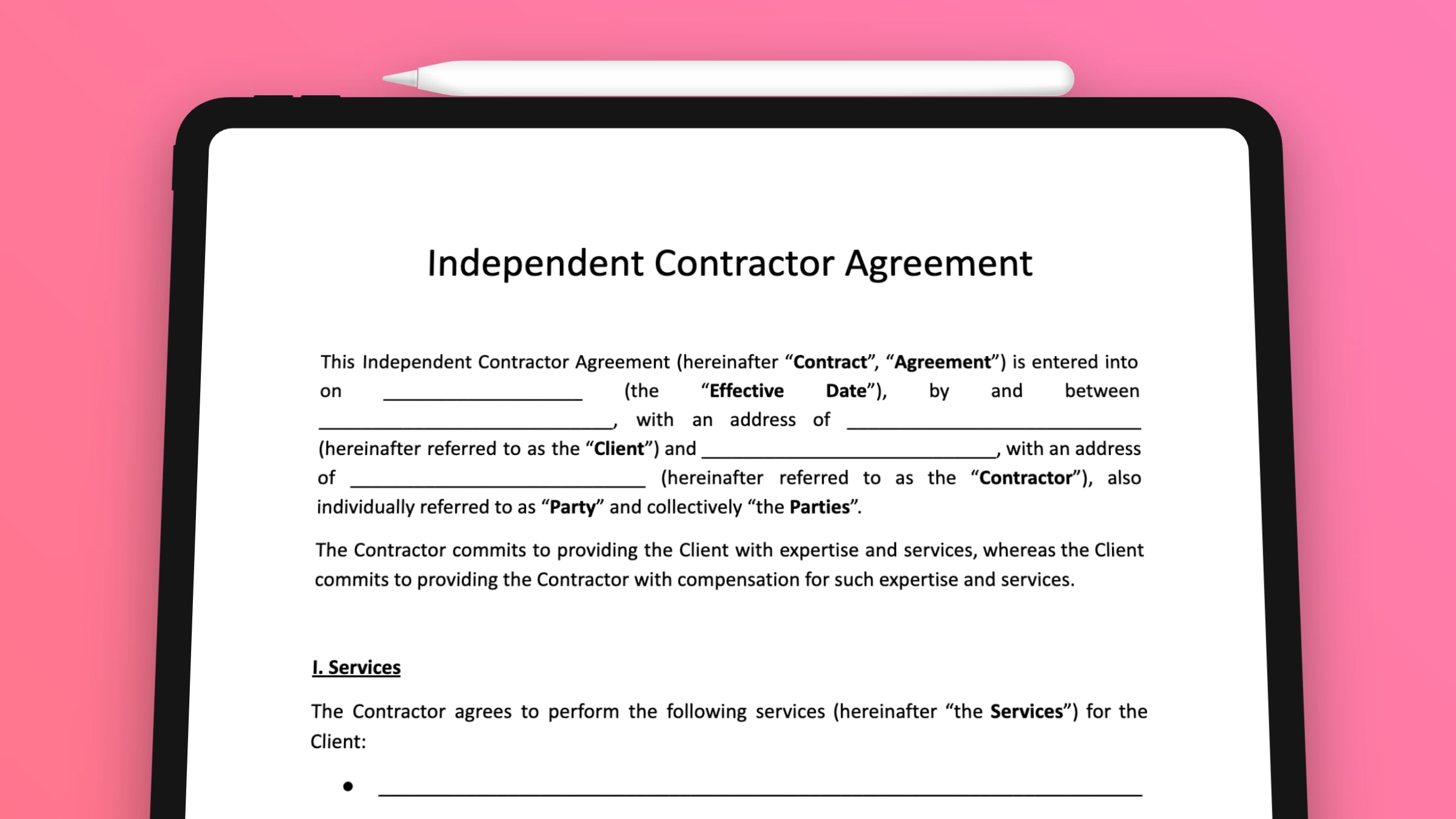Independent Contractor Agreement (What Freelancers Must Know)

Freelancers often face unclear boundaries when a job’s scope, payment terms, or intellectual property rights are not well defined. An Independent Contractor Agreement establishes clear rules for deliverables, invoicing, termination, confidentiality, liability, taxes, and ownership of work. Clear contract terms help protect income and professional reputation while minimizing misclassification and disputes. Sound agreements also reduce uncertainty during critical decision-making moments.
Well-drafted contracts incorporate essential milestones, confidentiality clauses, and indemnification details that build mutual trust. These agreements provide a solid foundation for effective working relationships by clarifying roles and expectations. Consistent contract management reduces administrative burdens and legal risks. Ontop offers streamlined payroll software that simplifies contractor payments and compliance tracking while keeping tax records organized.
Summary
- Independent contractor agreements convert vague promises into enforceable records that protect income and reduce disputes, and 45% of freelancers without such an agreement experienced payment delays.
- Explicit payment mechanics are essential as market rates rise: 75% of contractors reported hourly rate increases in 2025, and the average tech contractor rate is $85 per hour.
- Build acceptance as an objective, time-bound process, for example, a 7-business-day review window with a silent-acceptance clause, so deliverables cannot be stalled by indefinite signoffs.
- For remote and nomadic work, spell out classification and presence rules since 70% of digital nomads work as independent contractors, and include a days-per-country threshold, for example, 30 or 90 days, to trigger review or payroll conversion.
- Small administrative discrepancies, such as misnaming the legal payee or failing to meet PO requirements, can delay payments by weeks. Confirm the exact billing name and tax ID, and set short dispute windows, such as 14 days for contested invoices.
- Include recordkeeping and security timelines to satisfy audits, for example, a 72-hour breach notification requirement and a 15-day certificate of deletion for returned or destroyed data.
- This is where Ontop's payroll software fits in; it addresses cross-border payment and compliance friction by simplifying near-instant payouts, keeping tax records organized, and linking contract milestones to payment workflows.
What Is an Independent Contractor Agreement?

An independent contractor agreement is a written document that sets expectations, payment terms, ownership, and legal risk between a freelancer and a client, creating a binding contract. I treat it like an operational playbook: clear tasks, deadlines, and solutions, so both sides can work quickly without guessing.
What should the agreement actually say?
Start with scope and deliverables. Clearly describe tasks, acceptance criteria, milestones, and what makes a completed deliverable to prevent arguments about whether a job is done. Then explain payment details precisely: include rate, invoicing schedule, currency, late fees, spending policy, and who is responsible for taxes.
Market signals are important; according to Digital Republic Talent, 75% of contractors reported an increase in their hourly rates in 2025. This trend affects how renewal and escalation clauses are made. If you charge by the hour, be sure to set clear expectations. The average hourly rate for independent contractors in the tech industry is $85, according to Digital Republic Talent. This is a helpful benchmark when negotiating scopes and evaluating payroll software options for your business.
Who owns what, and how do you protect the work?
Specify an intellectual property assignment or a defined license, and pair that with clear acceptance testing so ownership transfers only when the client approves the work.
Include confidentiality and data handling rules tied to the governing law, along with a reasonable warranty period for defects.
What breaks when teams use ad hoc contracts, and what fixes it?
Most teams create agreements using old templates and email because it seems quick and familiar. This approach might work at first, but as international hiring increases, hidden problems can accumulate. Also, classification risk increases, and payroll or tax errors can delay payments and erode trust.
Tools like Ontop make contract creation easier with local compliance checks, keep documents organized, and enable fast cross-border payments. This helps teams reduce legal risks and ensure contractors are paid on time while maintaining clear records.
How should you write clauses for multi-country engagements?
Be clear about contractor classification, local tax duties, and who gives benefits or equipment. Use a governing law and dispute forum that both sides can easily access. If remote work occurs across multiple countries, include a section requiring the contractor to comply with local labor laws. Also, explain a migration plan in case local law requires payroll withholding in the future.
Keep termination and notice periods simple. Lastly, add a section on contract extensions, as many projects extend beyond short pilots.
What practical steps ensure these agreements work in practice?
Use simple language and include one table for payment terms, along with a single-page summary of deliverables on the first page. Require electronic signatures and store the executed contract in a shared compliance folder.
Additionally, schedule midpoint check-ins tied to milestone payments. It's important to treat the contract as a living instrument rather than a locked file: implement clear change-order rules to ensure that scope shifts are priced and approved quickly.
What risks do freelancers face when agreements are missing or poorly written?
That settled clarity can feel like the finish line. However, the next section outlines the real risks freelancers face when agreements are missing or poorly drafted.
Related Reading
- Independent Contractor
- How to Calculate Net Income
- Virtual Business
- Freelance Brand Scaling
- 1099 Form Independent Contractor
Why Freelancers Need an Independent Contractor Agreement

Freelancers need an independent contractor agreement because it turns vague promises into enforceable records you can use to protect income, prove status, and keep projects moving without guesswork. A signed contract serves as the operating evidence that enables you to defend payment, demonstrate professional stability to institutions, and negotiate from a position of clarity.
What concrete leverage does a contract give me with payors and platforms?
When payments are in dispute, the contract is not a nice-to-have; it is the document that unlocks collections paths, dispute resolution, and escrow options. It also speeds up financial onboarding: banks, payment providers, and wallets treat written agreements as proof of legitimate activity, reducing friction when you need faster payouts or a work-linked Visa card. This matters because inconsistent paperwork is exactly what drags funds into lengthy review cycles and results in rejected transfers.
Why does this matter for visas, audits, and regulatory checks?
This pattern appears across immigration, taxation, and lending: institutions require stable, documented commitments before granting access. The lack of formal agreements makes your freelance income appear transient, which complicates visa applications, home-loan underwriting, and tax audits. It is exhausting when a single missing contract turns routine verification into weeks of back-and-forth, and that delay can cost opportunities or even legal standing in a jurisdiction.
How does a contract change the odds of getting paid on time?
“45% of freelancers without an independent contractor agreement experienced payment delays." That finding explains why informal arrangements often become cashflow problems, not just awkward conversations. When payment terms and remedies are written, you gain a predictable invoicing cadence, leverage to request deposits or escrow, and cleaner records for collections or small-claims actions.
Does having a contract actually improve my professional standing?
“70% of freelancers reported that having a formal independent contractor agreement increased their job security." In practice, formal agreements change how clients manage you: they become a named counterparty in procurement and legal systems, reducing ad hoc cancellations and improving renewal velocity. That shift is why businesses that are willing to sign contracts are more likely to treat you as a consistent vendor rather than a one-time favor.
Most teams handle contracts by emailing PDFs because it feels quick and familiar. That works until jurisdictional checks, multiple stakeholders, and cross-border payroll requirements pile up, causing version chaos, missed compliance, and payment delays. Platforms like Ontop provide automated contract generation, local compliance checks, and instant payouts across multiple currencies, helping teams reduce onboarding time and keep funds flowing with clear audit trails.
What do freelancers miss when they skip the paperwork?
They lose credibility, predictable cash flow, and the simple ability to show auditors or immigration officers a clear relationship. You also forfeit a lever in negotiations, because a written, signed agreement is the single most portable proof of professional history when you pursue long-term retainer work or try to convert a client into a recurring project. It is painful to build a reputation and have it vanish because you relied on memory and trust rather than documentation.
That sounds final, but the clauses that actually deliver these protections are more surgical than most people expect.
What Every Independent Contractor Agreement Should Include

Every independent contractor agreement should go beyond promises and define the work processes that make those promises enforceable. This includes clear acceptance procedures, audit and data rules, clear risk-sharing with insurers and indemnities, subcontracting rules, and simple exit and transition processes.
These elements help ensure that the work can handle challenges and changes.
How can you make acceptance and milestones truly enforceable?
Create acceptance as a short, repeatable process instead of a vague sign-off. For example, require a written review period, such as seven business days after delivery, for functional tests and written approval or a defect log. If the client does not respond, add a silent acceptance clause that converts a no-response into acceptance after that period.
Also specify clear tests, sample datasets, version numbers, or checklist items that the deliverable must meet. Finally, include a simple change-order formula to automatically price additional requests.
What records, security, and privacy language should be in the contract?
Treat record keeping like a compliance checklist. Define retention periods for invoices, source files, and project logs. Specify encryption protocols for data at rest and in transit, and include breach notification timelines. For example, a 72-hour timeline for suspected data breaches, with designated contacts.
When personal data is involved, include a data processing addendum that lists subprocessors, outlines mechanisms for cross-border transfers, and specifies whether data must be deleted or returned upon termination. This should also encompass a certificate of deletion delivered within 15 days.
Who bears what liability, and how do you make it proportional?
Break liability into buckets with clear limits and exceptions. Limit general liability to a multiple of fees paid, but do not include intentional fraud or willful misconduct in that limit. For IP indemnities, have the contractor defend and pay any infringement judgment, but cap commercial damages to the contract value.
Also, require proof of insurance and specify the types and minimum amounts: professional liability at an agreed amount; cyber insurance for data exposure; and ensure the client is named as an additional insured when reasonable, with 30 days' notice before cancellation.
Can subcontracting or assignment undermine quality or compliance?
Yes, if control is lacking. It is essential to require that subcontracting be disclosed and that the contractor remain fully responsible for performance and compliance. For sensitive work, include a requirement to preapprove any subcontractor.
What should you require for an orderly exit or handover?
Insist on transition assistance that matches the level of engagement. For example, requires 10 business days of knowledge transfer, along with the delivery of editable source files or administrative credentials.
When it comes to software, consider using source code escrow or an IP escrow arrangement that activates upon nonpayment or insolvency.
It is important to clearly state what remains active after termination, which obligations continue, and who will pay for any third-party licenses required to keep operations running.
How do you write clauses that actually work in disputes?
Use triggers, not adjectives. Replace vague phrases like "reasonable efforts" with specific details, such as timeframes, percentages, and penalties.
For example, if a deliverable fails acceptance twice, the contractor has 10 business days to fix it; if it still does not meet requirements, the client may hire a third party and deduct verified remediation costs up to 20% of the remaining contract value. Clearly define invoice requirements, such as including a PO number, a line-item breakdown, and tax identification, and set a 14-day dispute period after which undisputed amounts must be paid.
What administrative minutiae prevent future fights?
Important administrative details include specifying notice addresses and acceptable delivery methods in the contract. It is essential to require signed written amendments for any changes and to include a severability clause.
Additionally, a survival list should identify the specific provisions that remain in effect after termination, such as payment terms, confidentiality, indemnities, IP licenses, and audit rights.
To enhance accessibility, maintain a single-page summary of critical terms appended to the signature page. This allows non-legal stakeholders to quickly read and understand the operating rules within just 60 seconds.
What Do Contracts Need to Function as Intended?
Contracts often feel like a manual for a machine you don't know how to use; they should be a clear guide.
A short, clear sentence can be more useful than many pages of unclear writing, as it clearly tells everyone what to do when problems come up.
What surprises contractors about contract drafting?
That sounds final, but what surprises contractors the most is how small drafting slips can create big, persistent problems.
Common Mistakes Freelancers Make With Contractor Agreements

Freelancers often stumble over practical and low-glamour details that block payment, create friction, or make enforcement hard. These mistakes aren't major legal errors but avoidable operational slips: misnamed parties, missing payment setups, unclear client responsibilities, and poor versioning practices that turn neat work into disputes months later.
Who is the legal counterparty, and who actually pays?
This might seem unimportant, but it can break deals. A common pattern among solo operators and small studios is that the contract names the client as, for example, Acme Marketing Ltd., but the accounts payable team needs invoices issued to Acme Holdings, Inc., or a specific vendor code. This mismatch can delay payments for weeks as procurement requests vendor setup forms, tax IDs, and a completed supplier profile.
Before signing, confirm the exact legal name, billing address, tax identifier, and whether a purchase order is needed. Ask who will sign on the client side, and note their title and authority level in the contract to avoid later chasing someone who can’t approve invoices.
What inputs and client actions are you waiting on?
Too often, timelines collapse because the freelancer thinks the client will deliver assets, credentials, or feedback on time. This is more about workflow than creativity. Clearly state client obligations with deadlines, acceptance of late-review consequences, and a clear solution when access is delayed.
For example, require the client to provide brand files and logins within five business days; otherwise, pause the timeline and charge for the idle time. Treat the client as a necessary step and define the consequences if that step fails.
How will money actually move across borders and into your account?
Many people think a bank transfer is a single step, but it often goes through correspondent banks, incurs conversion fees, or arrives with unexpected withholding. This is where hidden costs can sneak in and cut into your rate. Confirm the payment method, currency, who will pay the transfer fees, and the exact banking details required, such as IBAN, SWIFT BIC, and remittance instructions.
For repeat international payments, explore faster payout options and wallets to avoid delays and hidden intermediary fees. Platforms like Ontop get this friction. Most teams pay by traditional bank transfer because it is familiar, but this approach can lead to hidden delays and changing fees as volume increases. Solutions like Ontop centralize compliance, automate the correct contract language, and offer quick cross-border payouts with clear fee breakdowns, thereby speeding up settlement time and maintaining the agreed rate.
Are your deliverables and files versioned and labeled correctly?
A file-delivery argument is rarely about how it looks; it’s about evidence.
Projects can get stuck if a client receives only flattened PDFs when the contract required editable source files, or if filenames lack version numbers. Clearly specify file formats, naming styles, delivery locations, and who keeps the master files. Require that final deliverables include an editable master and a checksum or version tag so both parties can reference the same item if questions come up.
Did you check the client’s vendor onboarding and solvency signals?
Starting work before vendor setup or basic credit checks is a risky choice. Bigger clients often use accounts receivable systems that block unregistered vendors or hold funds until a purchase order is approved.
Smaller clients might change priorities and stop responding. Before starting work, request the client’s onboarding checklist and vendor registration timeline. If the client takes longer during onboarding, consider this a warning sign and possibly ask for a larger upfront deposit, escrow, or milestone-based prepayment.
Are administrative trails and dispute triggers simple and enforceable?
While complex dispute clauses might sound good, they can slow down resolution. Instead, set practical steps: a 10-business-day review window for disputed invoices, a named mediator with a defined timeline, and an agreed-upon list of evidence, such as time logs or signed task confirmations.
Make escalation processes easy and straightforward. If you expect to issue frequent invoices, automate reminders and include a late fee formula so your collection process doesn’t depend on memory or goodwill.
Contracts are only as useful as the small rules made to keep daily work going. Missing those small rules can turn the contract into a paperweight instead of a helpful tool.
That practical tension is just the beginning, and the next part reveals how those same mistakes can grow when working from anywhere in the world.
Related Reading
- How to Send an Invoice
- Contractor Invoice
- Self-Employed Jobs
- How to Become a Freelancer
- How to Invoice as a Freelancer
How Independent Contractor Agreements Work for Digital Nomads

Independent contractor agreements for digital nomads must do one thing well: translate a movable, multinational working relationship into a set of predictable, enforceable rules that everyone can follow. That matters because, according to the Global Digital Nomad Report 2025, 70% of digital nomads work as independent contractors. Most remote workers now operate under contractor terms in 2025, so these clauses serve as the operating manual for how real work and real risk are allocated.
How can a contract prevent accidental employment exposure?
Put physical-presence rules in writing, with exact triggers. Specify a days-per-country threshold, for example, a maximum of 30 or 90 days in any single client jurisdiction before the parties must revisit classification and tax obligations. Require prompt notification when the contractor plans extended travel to a client country, and add a narrowly worded indemnity for payroll, social security, or local labor claims arising from that extended presence. Finally, add a practical remedy sequence: a temporary pause in services, renegotiation of terms, or a short-term payroll conversion, so the clause is actionable rather than aspirational.
What must a privacy and cross-border data clause require when the contractor moves between countries?
Build a concise data addendum that names the legal basis for processing, the data transfer mechanism, and the contractor’s responsibilities if hosting or accessing data from another territory. Require the signing of Standard Contractual Clauses where relevant, specify the data locations contractors may use, and define a short notification window for suspected breaches. Include cooperation obligations for data subject requests, and a commitment to hand over logs or attestations that let the client meet audit or regulator queries quickly.
Most teams rely on ad hoc templates and email approvals because that feels fast and familiar. As projects scale, those quick fixes fragment across stakeholders, create inconsistent local compliance language, and turn simple onboarding into a days-long procurement chase. Platforms like Ontop provide automated, locally tailored contract generation and link contract triggers to compliance checks and payouts, reducing manual corrections and compressing onboarding from days to hours while keeping an auditable trail.
Which dispute-resolution model actually works across borders?
Choose tiered dispute resolution, starting with short mediation, then a single arbitration forum with a neutral seat and limited emergency relief options in local courts. Name the language for proceedings, set a modest cap on recoverable fees for small claims, and require interim injunctive relief to be available in the contractor’s local jurisdiction if necessary. The trade-off is clear: arbitration provides enforceable awards under the New York Convention, but it incurs costs, so balance predictability with affordability by offering expedited procedures for disputes below a defined threshold.
How do you structure portable perks, wallets, and benefits without creating tax surprises?
Treat perks as contract line items, not informal extras. Call out whether a payment is a stipend, reimbursement, or noncash benefit, and require the contractor to handle local reporting unless the parties agree otherwise in writing. If you offer wallets or card perks, specify KYC responsibilities, caps, fee allocation, and who bears currency conversion costs at the time of loading. That level of clarity matters because, according to the Global Digital Nomad Report 2025, 85% of digital nomads prefer flexible contract terms. Most nomads want optionality rather than rigid employment-style benefits, so make flexibility explicit and make taxable consequences visible.
What evidence helps both sides survive an audit or legal challenge?
Beyond the signed agreement, assemble an evidence packet to demonstrate that the working relationship aligns with the contract. On the contractor side, maintain business registration, multi-client invoices, and marketing or platform profiles that demonstrate independent activity.
On the client side, preserve procurement approvals, supplier setup forms, and documentation showing the contractor bore business risk, invoiced independently, and was not paid through payroll. Name a short checklist in the contract for documents to be produced within a fixed window if regulators or auditors request them, so neither party is scrambling when compliance matters surface.
That sounds tidy, but the clause-level choices you make today decide whether a nomad’s next trip is free and simple, or a legal headache that eats weeks of work and reputation.
See How Ontop Helps Freelancers Work Safely and Get Paid Smoothly
Juggling invoices, tax forms, and late payments can steal time from the work freelancers love, adding stress to every pitch. A platform like Ontop connects independent contractor agreements with predictable payment rails, cash flow forecasting, and fast dispute support. This way, freelancers can ensure they get paid smoothly while focusing on building great work. payroll software
Related Reading
- Contractor Payment Solutions
- Paying Freelancers
- Contractor Payment Services
- Contractor of Record
- Payment Methods for Freelancers





.avif)


